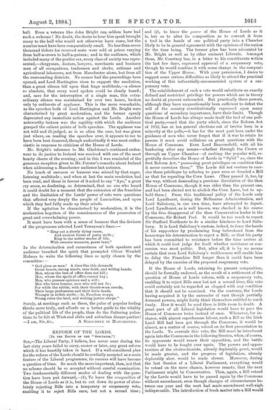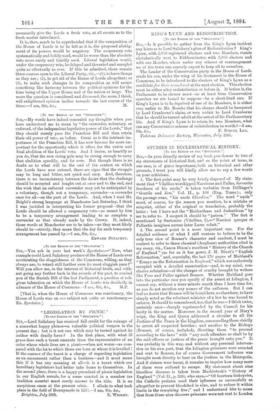REFORM OF THE LORDS.
[To THB EDITOR Or THE "SPECTATOR."]
Sta,—The Liberal Party, I believe, has never once during the last sixty years failed to carry, sooner or later, any great reform which it has heartily taken in hand. If a well-considered plan for the reform of the Lords should be cordially accepted as a main feature of the Liberal programme, its success will have become a question of time. So much the more important, then, is it that no scheme should be so accepted without careful examination. Two fundamentally different modes of dealing with the ques- tion have been put forward,—(1), To leave the composilion of the House of Lords as it is, but to cut down its power of abso- lutely rejecting Bills into a temporary or suspensory veto, enabling it to reject Bills once, but not a second time ; and (2), to leave the power of the House of Lords as it is, but so to alter its composition as to convert it from a tool in the hands of one political party into a Chamber likely to be in general agreement with the opinions of the nation for the time being. The former plan has been advocated by Mr. Bright as well as by other eminent Liberals. Amongst them, Mr. Courtney has, in a letter to his constituents within the last few days, expressed approval of a suspensory veto, though he would combine it with some change in the composi- tion of the Upper House. With your permission, I desire to suggest some serious difficulties as likely to attend the practical working of this influentially-recommended system of a sus- pensory veto.
The establishment of such a veto would substitute an exactly defined and restricted privilege for powers which are in theory no doubt at present unbounded. But practically these powers, although they have unquestionably been sufficient to defeat the will of the country constitutionally expressed upon many questions of secondary importance, have their limits. Though the House of Lords has always made itself the tool of one poli- tical party,—and that the party which, since the Reform Act of 1832, has at ten general elections out of twelve been in a minority at the polls,—it has for the most part been under the guidance of men who never forgot that if it was to retain its powers it must avoid collisions on great questions with the House of Commons. Even Lord Beaconsfield, with all his hankering after any means—whether through the Crown or through an Upper Chamber—of curbing the popular will, re- gretfully describes the House of Lords in "Sybil" as, since the first Reform Act, "possessing great privileges on condition that it never exercises them." The Lords did not venture to exer- cise these privileges by refusing to pass even so dreaded a Bill as that for repealing the Corn Laws. (They passed it, too, by the way, without demanding a previous dissolution of the them House of Commons, though it was older than the present one, and had been elected not to abolish the Corn Laws, but to up- hold them.) From this traditional policy of the Lords only Lord Lyndhurst, during the Melbourne Administration, and Lord Salisbury, in our own time, have attempted to depart. Lord Lyndhurst, as is well known, was checked in his course by the firm disapproval of the then Conservative leader in the Commons, Sir Robert Peel. It would be too much to expect Sir Stafford Northcote to do a similar kindness to Lord Salis- bury. It is Lord Salisbury's custom, indeed, to force the hands of his supporters by proclaiming long beforehand from the house-tops his determination to reject a Bill; so that his party has been committed to resistance before the time arrives at which it could best judge for itself whether resistance or con- cession was most politic. But, after all, it is by no means certain that even Lord Salisbury's recklessness will enable him to delay the Franchise Bill longer than it could have been delayed by the exercise of the proposed suspensory veto.
If the House of Lords, retaining its present composition, should be formally endowed, as the result of a settlement of the question of House of Lords reform, with a suspensory veto, enabling it to reject Bills once but not a second time, this veto could certainly not be regarded as clogged with any condition that it should not be exercised. On the contrary, the Lords having acquired it by the surrender of vast though partially dormant powers, might fairly think themselves entitled to use it freely. How it would be used there is little room to doubt. A great part of all Liberal legislation would have to pass the House of Commons twice instead of once. Whenever, for in- stance, with almost superhuman labour, such a Bill as the Irish Land Bill had been got through the Commons, it would be almost, as a matter of course, vetoed on its first presentation to the Lords. To overrule this veto, the Bill must be introduced again into the Commons in the following Session, when, of course, its opponents would renew their opposition, and the battle would have to be fought over again. The powers and oppor- tunities of the obstructionists, already deplorably great, would be made greater, and the progress of legislation, already deplorably slow, would be made slower. Moreover, during the last Session of a Liberal Parliament, everything would be vetoed on the mere chance, however remote, that the next Parliament might be Conservative. Then, again, a Bill vetoed by the Lords would have to be passed again by the Commons without amendment, even though changes of circumstances be- tween one year and the next had made amendment well-nigh, indispensable. The introduction of fresh matter into a Bill would necessarily give the Lords a fresh veto, at all events as to the fresh matter introduced.
It is, then, much to be apprehended that if the composition of the House of Lords is to be left as it is, the proposed abridg- ment of its powers would be nugatory. The suspensory veto systematically and boldly used, would be worse than the absolute veto more rarely and timidly used. Liberal legislation would, under the suspensory veto, be delayed and thwarted and mangled quite as effectually as ever. If this be admitted, there remain three courses open to the Liberal Party, viz.,—(1), to leave things as they are ; (2), to get rid of the House of Lords altogether; or (3), to make such changes in its composition as will secure something like harmony between the political opinions for the time being of the Upper House and of the nation at large. The more the question is considered and discussed, the more, I think, will enlightened opinion incline towards the last course of the



































 Previous page
Previous page